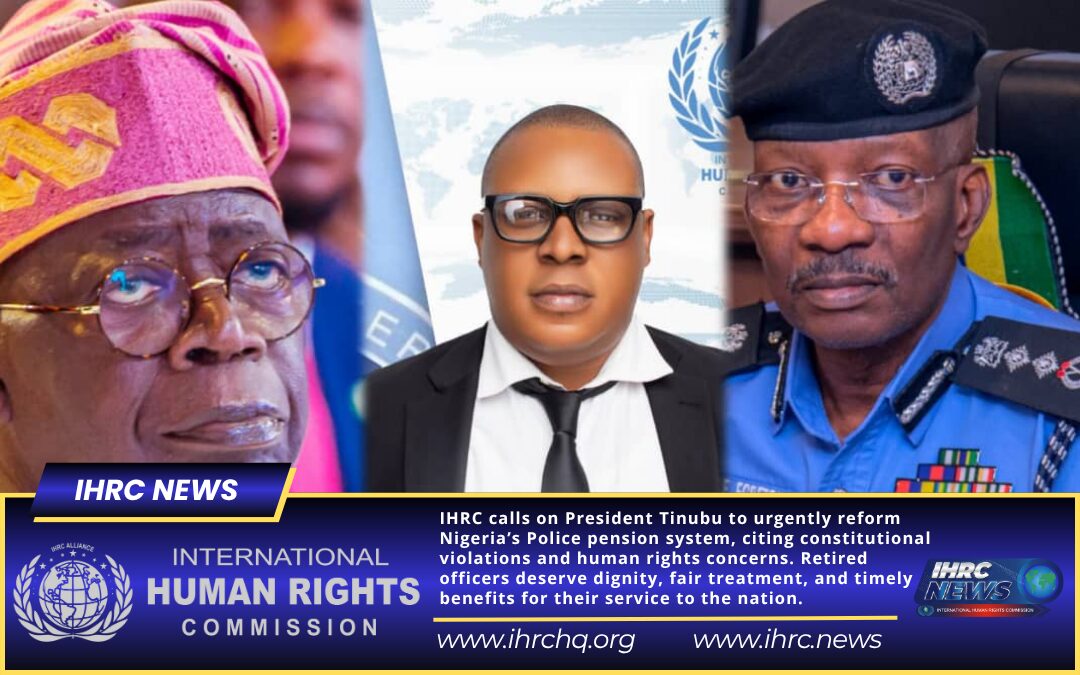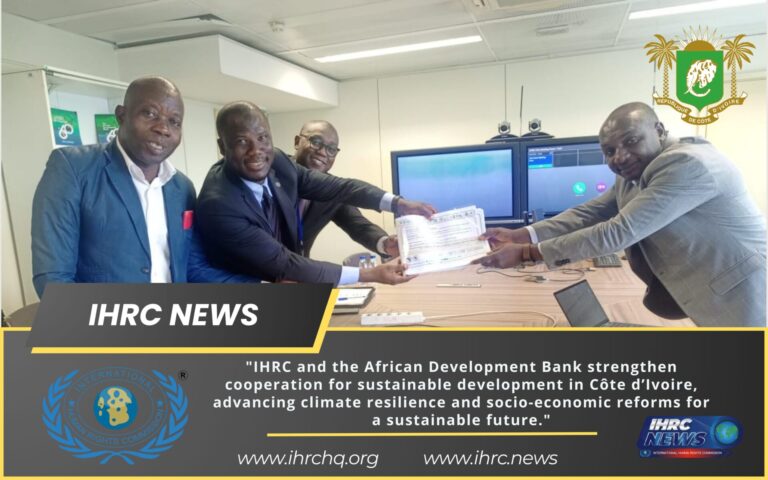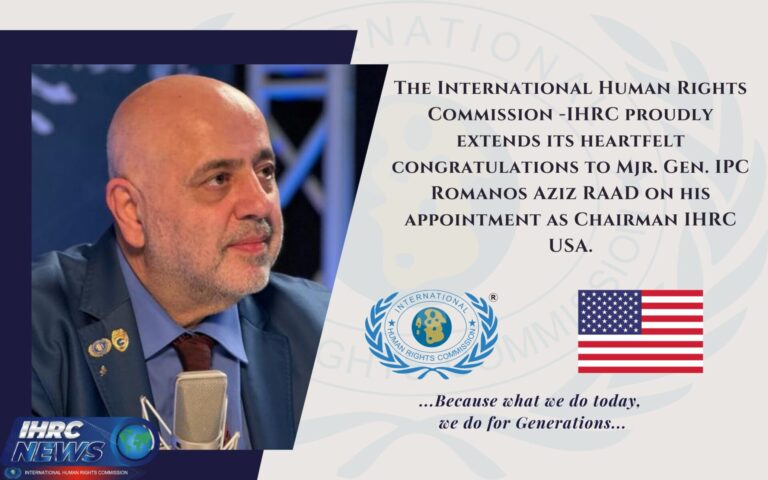Diplomatic Appeal Calls on President Tinubu to Uphold Constitutional Rights of Retired Police Officers
Abuja, Nigeria | 6 July 2025
IHRC Steps In: A Call for Justice in Police Pension Welfare
In a constitutionally grounded and diplomatically significant intervention, the International Human Rights Commission (IHRC) Corporation in Nigeria has issued a formal appeal to President Bola Ahmed Tinubu, urging immediate reform of the Contributory Pension Scheme (CPS) as it affects retired officers of the Nigeria Police Force. This action directly echoes and supports the persistent advocacy of Inspector-General of Police (IGP) Dr. Kayode Adeolu Egbetokun for comprehensive pension reform.
Highlighting Constitutional Breaches
The appeal, titled “A Diplomatic Appeal for Police Pension Welfare Reform in Line with the Constitution of the Federal Republic of Nigeria,” was signed by H.E. Ambassador Dr. Duru Hezekiah, Head of IHRC’s Diplomatic Mission in Nigeria. The document points to constitutional irregularities in the current pension scheme for Police officers, specifically referencing Sections 17(3)(f) and 34(1)(a) of the 1999 Constitution (as amended), which enshrine the dignity and welfare of all citizens—particularly public servants.
Recent High-Level Engagement
The IHRC’s intervention follows a high-level meeting on 1 July 2025 at the Force Headquarters in Abuja, where IGP Egbetokun received delegations from the National Association of Retired Police Officers of Nigeria (NARPON), led by AIG Paul O. Ochonu (Rtd), and a coalition of CPS retirees, led by CP Henry Njoku Esq (Rtd).
During the meeting, the IGP reaffirmed the Nigeria Police Force’s unwavering commitment to the welfare of its retirees. He openly acknowledged the “deep-seated inadequacies” of the CPS, pledging to pursue sustainable solutions that guarantee timely and adequate disbursement of retirees’ entitlements.
“Our retirees deserve dignity, support, and a structure that reflects their sacrifice and service to Nigeria,”
— IGP Dr. Kayode Adeolu Egbetokun.
This statement builds upon earlier remarks made by the IGP in February 2025, when he described the CPS as an “inadequate arrangement” that has left thousands of retired officers in hardship due to meagre benefits and delayed payments.
IHRC Adds Legal and Diplomatic Weight
By issuing this appeal, the IHRC strengthens the growing national demand for reform and directly urges President Tinubu to act in accordance with his Renewed Hope Agenda—centred on social justice, constitutional order, and public welfare.
“Reforming the Police pension system is not only a matter of human rights and dignity—it is a constitutional obligation,”
— H.E. Dr. Duru Hezekiah, IHRC Nigeria.
The Commission highlights the inequity between military retirees (who are exempt from the CPS and enjoy a tailored scheme) and Police retirees, whose dangerous duties demand similar recognition. IHRC maintains that this disparity must be corrected if the administration is genuinely committed to fairness and national security.
A Unified Call for Justice
As the nation reflects on the invaluable contributions of its retired Police officers, IHRC, NARPON, and the Nigeria Police Force now speak with a unified voice, calling for justice, urgent reform, and restitution. The outcome now depends on the leadership of President Bola Ahmed Tinubu, whose action on this matter could mark a historic commitment to constitutional values and the welfare of those who served.
Prepared by:
Fidelis Onakpoma
Head of Media and Strategic Communications IHRC Nigeria









A Commendable Stand for Justice: IHRC’s Timely Intervention on Police Pension Reform
The International Human Rights Commission, Nigeria, deserves profound commendation for its principled and timely intervention in the ongoing crisis affecting retired police officers under the Contributory Pension Scheme. The commission’s diplomatic appeal to President Bola Ahmed Tinubu, titled “Diplomatic Appeal for Police Pension Welfare Reform in Line with the Constitution of the Federal Republic of Nigeria,” represents a masterful blend of legal scholarship, moral advocacy, and strategic diplomacy that elevates the discourse on police pension reform from mere sectoral grievance to constitutional imperative.
The IHRC’s decision to frame this issue within the constitutional framework demonstrates exceptional legal acumen and strategic thinking. By grounding their appeal in Sections 17(3)(f) and 34(1)(a) of the 1999 Constitution, the commission has transformed what critics might dismiss as special pleading into a fundamental question of constitutional compliance. This approach not only strengthens the legal foundation of the retired officers’ case but also places the government’s response within the broader context of constitutional governance and rule of law.
Ambassador Duru Hezekiah’s leadership in articulating the commission’s position reflects a deep understanding of both the human dimensions of this crisis and the constitutional principles at stake. His statement that “the commission firmly supports the Inspector-General of Police’s ongoing advocacy for a just and equitable pension scheme for retired police officers” demonstrates the kind of institutional solidarity that strengthens democratic governance. The commission’s recognition of Inspector-General Egbetokun’s leadership on this issue shows a commendable ability to work collaboratively with domestic institutions while maintaining its independent voice.
The commission’s characterization of the current pension arrangement as a “constitutional breach” represents more than rhetorical flourish; it reflects a sophisticated understanding of the relationship between constitutional provisions and practical governance. The IHRC’s assertion that “thousands of retired police officers are living in hardship under a pension system that disregards the realities of law enforcement service” connects abstract constitutional principles with lived human experience, making the legal argument both intellectually compelling and emotionally resonant.
Particularly noteworthy is the commission’s ability to articulate the fundamental injustice of treating police officers differently from their military counterparts. The observation that “the military has rightly been removed from the CPS because of the peculiar nature of their job” and that “the same logic applies—if not more so—to police personnel” demonstrates clear thinking about equity and consistency in public policy. This comparative analysis strengthens the case for reform by highlighting the arbitrary nature of current distinctions.
The IHRC’s diplomatic approach in addressing President Tinubu deserves special recognition. Rather than adopting a confrontational stance, the commission has chosen to appeal to the President’s commitment to constitutional governance and his Renewed Hope Agenda. This strategic choice demonstrates political wisdom and increases the likelihood of productive engagement. The commission’s statement that “this government has the opportunity to right this historical wrong and restore dignity to our Police retirees” frames the appeal as an opportunity for positive legacy-building rather than a demand for damage control.
The timing of the IHRC’s intervention is particularly commendable. By acting in support of the Inspector-General’s ongoing advocacy and ahead of the planned nationwide protest by retired officers, the commission has positioned itself as a constructive force for peaceful resolution. This proactive approach demonstrates the kind of preventive diplomacy that can help resolve conflicts before they escalate into more serious confrontations.
The commission’s emphasis on the constitutional and moral dimensions of this issue reflects a mature understanding of governance challenges. Their assertion that “reforming the police pension structure is not merely a policy issue—it is a constitutional and moral obligation” elevates the debate beyond technical administrative concerns to fundamental questions of justice and human dignity. This perspective enriches the national conversation and provides a framework for sustainable resolution.
The IHRC’s intervention also demonstrates the valuable role that human rights organizations can play in strengthening democratic governance. By bringing international human rights perspectives to bear on domestic policy challenges, the commission has shown how civil society organizations can contribute to constitutional governance and social justice. This kind of constructive engagement between civil society and government represents the best of democratic practice.
The commission’s detailed understanding of the challenges facing retired police officers, evidenced in their comprehensive analysis of the systemic flaws in the CPS, demonstrates thorough research and genuine commitment to the cause. Their recognition that “these officers spent their lives in service—often in the face of extreme danger—yet they retire into poverty and indignity” shows both factual accuracy and moral clarity that strengthens their advocacy.
The IHRC’s ability to connect this specific issue to broader principles of constitutional governance and human rights protection demonstrates strategic thinking that serves the national interest. By framing police pension reform as part of the larger project of building a constitutional democracy that respects human dignity, the commission has contributed to the development of a more coherent and principled approach to governance challenges.
The commission’s respectful but firm tone in addressing the President strikes the right balance between advocacy and diplomacy. Their approach demonstrates how civil society organizations can engage constructively with government while maintaining their independent voice and commitment to their principles. This model of engagement strengthens democratic institutions and processes.
The IHRC’s intervention comes at a crucial moment when the convergence of domestic advocacy, international attention, and constitutional imperatives creates an unprecedented opportunity for meaningful reform. The commission’s ability to recognize and act on this opportunity demonstrates political wisdom and strategic acumen that serves both the immediate interests of retired police officers and the broader cause of constitutional governance.
In conclusion, the International Human Rights Commission, Nigeria, has rendered exceptional service to the nation through its principled intervention in the police pension crisis. Their diplomatic appeal to President Tinubu represents the kind of constructive advocacy that strengthens democratic governance while advancing human rights and constitutional principles. Ambassador Hezekiah and his team deserve recognition for their leadership in transforming a sectoral grievance into a constitutional imperative that demands urgent attention.
The commission’s work on this issue exemplifies the vital role that human rights organizations can play in promoting justice, equality, and constitutional governance. Their intervention has not only strengthened the case for police pension reform but has also contributed to the development of a more principled and coherent approach to governance challenges. This kind of constructive engagement between civil society and government represents the best hope for building a democracy that truly serves all its citizens.
The IHRC’s diplomatic appeal stands as a model of how advocacy organizations can effectively engage with complex policy challenges while maintaining their commitment to human rights principles and constitutional governance. Their intervention deserves not only commendation but also the serious consideration and prompt action that the gravity of the situation demands.
This is a commendable and much-needed initiative. Police officers dedicate their lives to protecting society, and it is only fair that their welfare—especially after retirement—is given the attention it deserves. IGP Egbetokun’s commitment to pension reform reflects a bold step toward justice and accountability. I also appreciate IHRC’s support in advocating for such reforms, which align with its mission to promote human rights, dignity, and institutional transparency. Together, we can build a more just and secure future.
@ibrahim babangida musa
Babangidamusa1992@gmail.com